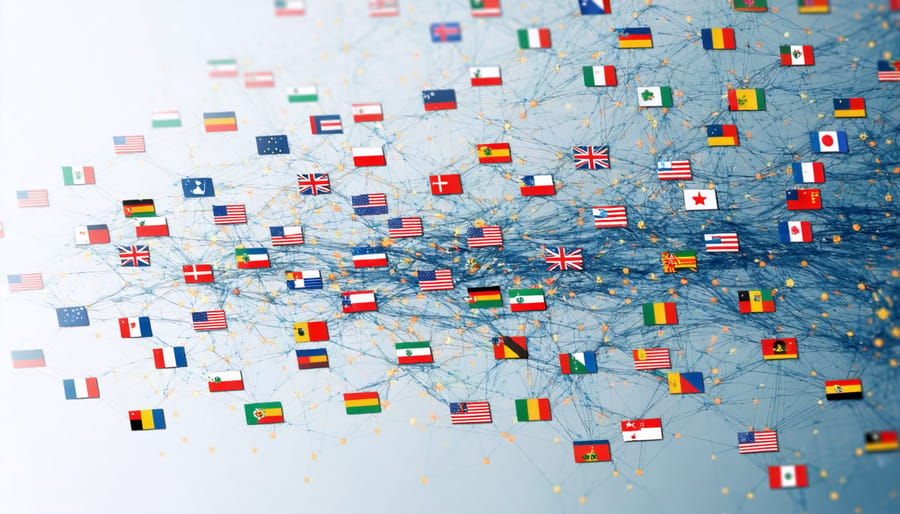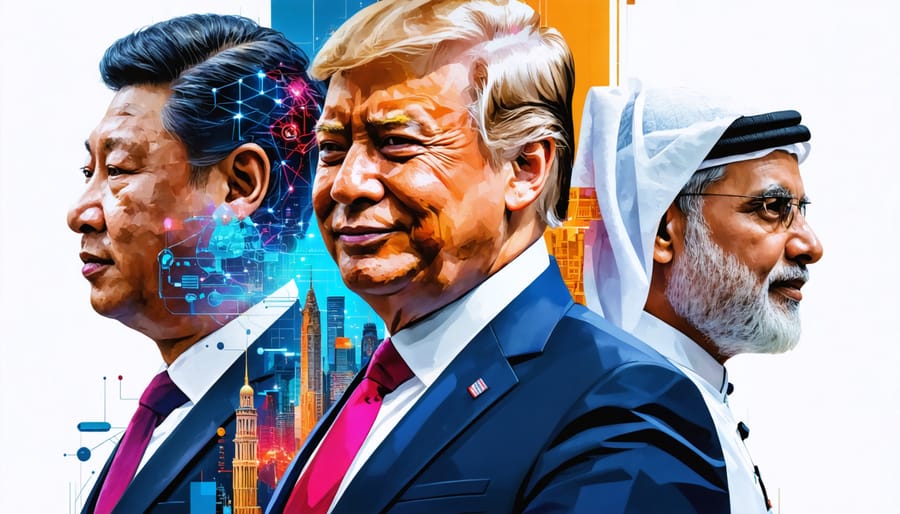As artificial intelligence transforms the global landscape, a new generation of nationalist leaders from non-Western nations is actively reshaping global AI development with unprecedented determination. From India’s Modi to China’s Xi Jinping, these leaders are championing technological sovereignty, challenging Silicon Valley’s dominance, and rewriting the rules of digital innovation. Their vision extends beyond mere economic growth – it’s a calculated push to establish their nations as technological powerhouses while preserving cultural identity and national security interests.
Unlike their Western counterparts, these leaders are implementing distinctly local approaches to AI development, often prioritizing state control and domestic innovation over international collaboration. Their policies reflect a complex balance between rapid technological advancement and maintaining political authority, creating a new paradigm that’s fundamentally altering the global tech landscape. This shift marks a significant departure from the Western-centric model of technological progress, introducing diverse perspectives and methodologies that are increasingly influential in shaping the future of artificial intelligence.
As these leaders continue to invest heavily in AI infrastructure and talent development, their impact on global technology standards and digital governance becomes increasingly significant, forcing the world to reconsider traditional power dynamics in the tech sector.
The Rise of AI Nationalism in Asia
China’s AI Ambitions Under Xi Jinping
Under Xi Jinping’s leadership, China has positioned itself as a global frontrunner in AI development, with ambitious goals to become the world’s leading AI power by 2030. The government’s strategy combines massive investments in AI research and development with nationalist policies that prioritize domestic technology advancement.
China’s approach to transforming digital technology reflects its broader vision of technological self-reliance. The country has implemented a comprehensive AI development plan that includes substantial funding for research institutions, support for domestic tech companies, and the creation of AI industrial parks across major cities.
Key initiatives include the development of facial recognition systems, smart city infrastructure, and AI-powered surveillance technology. These developments serve both economic and political objectives, allowing China to enhance its technological capabilities while maintaining strict control over data and digital infrastructure.
The nationalist undertones of China’s AI strategy are evident in policies that favor domestic companies and restrict foreign technology firms’ operations. This approach has accelerated indigenous innovation but also raised concerns about digital sovereignty and global tech competition.
Despite international scrutiny, China continues to expand its AI capabilities through programs like the Military-Civil Fusion strategy, which integrates civilian technological innovations with military applications. This demonstrates how nationalist leadership can shape technological development to serve both economic and strategic national interests.

India’s Digital Vision and Modi’s Tech Initiative
Under Prime Minister Narendra Modi’s leadership, India has embarked on an ambitious journey to establish itself as a global technology powerhouse. The “Digital India” initiative, launched in 2015, serves as the cornerstone of this vision, aiming to transform India into a digitally empowered society and knowledge economy.
Modi’s government has prioritized artificial intelligence development through programs like “AI for All” and the National AI Strategy. These initiatives focus on leveraging AI to address uniquely Indian challenges while promoting technological self-reliance. The establishment of AI research centers across premier institutions and partnerships with tech giants demonstrates India’s commitment to indigenous AI development.
The “Make in India” campaign has been instrumental in attracting tech manufacturing and fostering local innovation. This nationalist approach to technology development has led to significant achievements, including the development of India’s own digital payment system (UPI) and the world’s largest biometric identification program (Aadhaar).
India’s tech policies strongly emphasize data sovereignty and localization. The Personal Data Protection Bill and restrictions on foreign tech companies reflect a growing trend of digital nationalism. However, this approach has sparked debates about balancing national interests with global technological collaboration.
The government’s focus on digital literacy and skill development through programs like Skill India aims to create a workforce capable of driving India’s tech ambitions while reducing dependency on foreign expertise.
Middle Eastern AI Innovation
UAE’s AI Ministry and Mohammed bin Zayed’s Tech Vision
The United Arab Emirates has emerged as a pioneer in integrating artificial intelligence into government operations, marked by the groundbreaking appointment of Omar Al Olama as the world’s first Minister of State for Artificial Intelligence in 2017. This bold move reflects President Mohammed bin Zayed’s vision of transforming the UAE into a global AI powerhouse by 2031.
Under bin Zayed’s leadership, the UAE launched the National Strategy for Artificial Intelligence 2031, investing heavily in AI infrastructure, education, and research facilities. The strategy aims to reduce government costs by 50% through AI integration while positioning the UAE as a testing ground for emerging technologies.
The Emirates’ approach combines traditional leadership values with technological innovation, establishing partnerships with leading global tech companies and research institutions. Notable initiatives include the AI-driven “Area 2071” innovation hub in Dubai and the Mohamed bin Zayed University of Artificial Intelligence (MBZUAI), the world’s first graduate-level AI research institution.
Bin Zayed’s tech vision extends beyond domestic development, fostering international collaboration through programs like the UAE-India AI Bridge and partnerships with Chinese tech giants. This strategic approach demonstrates how nationalist leadership can effectively drive technological advancement while maintaining cultural identity and sovereignty.
The UAE’s AI initiatives serve as a model for other nations, showing how focused government support and clear strategic vision can accelerate technological development while preserving national interests and values.
Saudi Arabia’s NEOM Project and Vision 2030
Crown Prince Mohammed bin Salman’s ambitious NEOM project represents Saudi Arabia’s bold vision to establish itself as a global technology leader. This $500 billion mega-city project, a cornerstone of Vision 2030, aims to revolutionize Saudi Arabia’s economy through advanced technologies like artificial intelligence, robotics, and renewable energy.
The project’s centerpiece, “The Line,” showcases Saudi Arabia’s commitment to technological infrastructure development, featuring a 170-kilometer linear city designed to house 9 million residents in a car-free, carbon-neutral environment. AI systems will manage everything from transportation to utilities, creating a living laboratory for next-generation urban technologies.
Vision 2030’s technology initiatives extend beyond NEOM, encompassing nationwide digital transformation programs, AI research centers, and partnerships with global tech leaders. The kingdom has invested heavily in training its youth population in AI and computer science, establishing specialized academies and offering scholarships for international study in technology fields.
This push toward technological sovereignty reflects a broader trend among non-Western nations seeking to reduce dependence on foreign technology while developing indigenous capabilities. However, the success of these initiatives will depend on Saudi Arabia’s ability to attract international talent, foster innovation, and navigate the complex geopolitical landscape of global tech development.

African AI Leadership
Rwanda’s Digital Transformation
Under Paul Kagame’s leadership, Rwanda has emerged as Africa’s leading technology hub, earning the nickname “Africa’s Singapore” for its rapid digital transformation. The country’s ambitious Vision 2020 and Vision 2050 programs have prioritized technological advancement as a cornerstone of national development, demonstrating how nationalist policies can drive digital innovation.
Rwanda’s transformation began with basic digital infrastructure development, including a nationwide fiber-optic network that now connects 95% of the population. This foundation enabled the launch of groundbreaking initiatives like the Kigali Innovation City, a technology cluster designed to attract international tech companies and nurture local startups.
The government’s commitment to digital literacy has been equally impressive. The “One Laptop per Child” program and mandatory coding classes in primary schools have created a tech-savvy younger generation. Rwanda has also become the first country to adopt a comprehensive national drone delivery network, using autonomous aircraft to deliver medical supplies to remote areas.
Kagame’s administration has implemented progressive policies to attract tech investment, including tax incentives for technology companies and streamlined business registration processes. The Rwanda Information Society Authority (RISA) oversees these initiatives, ensuring alignment with national development goals while maintaining local control over digital infrastructure.
Notable achievements include the establishment of the Carnegie Mellon University-Africa campus in Kigali, producing high-caliber tech professionals, and the creation of the Rwanda Digital Ambassadors Program, which trains young people to teach digital skills in their communities. The country has also pioneered blockchain technology in land registration and digital identity systems.
However, critics note that this digital transformation has occurred within a tightly controlled political environment. While the tech initiatives have undoubtedly modernized Rwanda’s economy, they also serve as tools for maintaining centralized authority and monitoring citizens. This dual nature of Rwanda’s digital revolution illustrates the complex relationship between nationalist governance and technological advancement in developing nations.
Impact on Global AI Development
Technological Sovereignty
In recent years, non-Western nationalist leaders have increasingly prioritized technological independence, particularly in artificial intelligence development. This push for “AI sovereignty” reflects a broader desire to reduce reliance on Western technology giants and establish domestic technological capabilities.
Countries like China, Russia, and India have implemented ambitious national AI strategies, backed by substantial government funding and policy support. China’s approach stands out with its “Made in China 2025” initiative, which aims to achieve self-sufficiency in critical technologies. The country has invested heavily in domestic chip manufacturing and AI research centers, while also implementing data localization laws that favor local tech companies.
Russia has taken similar steps through its “AI Development Strategy,” emphasizing the development of indigenous AI capabilities and restricting foreign technology dependencies. The country has mandated the use of domestic software in government institutions and encouraged the creation of local alternatives to Western platforms.
India’s “Digital India” and “Make in India” campaigns represent another example of technological nationalism, with the government actively promoting local tech startups and AI research institutions. The country has developed its own digital payment systems and cloud infrastructure to reduce dependence on foreign solutions.
These initiatives often combine economic protectionism with national security concerns. Leaders argue that technological sovereignty is crucial for maintaining political independence and protecting national interests. However, this approach has led to increased technological fragmentation and potential challenges for global collaboration in AI development.
The push for technological sovereignty has also sparked a race for AI talent retention and development, with countries implementing policies to prevent brain drain and attract skilled professionals back to their home nations.

International Collaboration vs. Competition
Non-western nationalist leaders face a complex balancing act between protecting their domestic AI industries and participating in global technological advancement. While many emphasize self-reliance and technological sovereignty, they increasingly recognize that complete isolation could hinder their progress in AI development.
Countries like China and India have adopted hybrid approaches, strategically collaborating on research projects and data sharing initiatives while maintaining strict control over their domestic tech sectors. This selective engagement allows them to benefit from international expertise while protecting their national interests.
The competition for AI supremacy has led to both protective measures and strategic partnerships. For instance, while China restricts foreign tech companies’ access to its market, it actively participates in international AI research conferences and academic exchanges. Similarly, India’s digital nationalism coexists with its role as a global IT services hub, demonstrating how countries can maintain nationalist policies while remaining integrated into global tech networks.
These leaders must also navigate the ethical implications of AI development within an international context. Their decisions about data privacy, algorithmic bias, and AI governance often reflect a tension between national values and global standards.
The future of AI development increasingly depends on finding the right balance between competition and collaboration. While nationalist policies may protect domestic industries in the short term, sustainable AI advancement requires some degree of international cooperation, knowledge sharing, and standard-setting to address global challenges effectively.
The rise of non-Western nationalist leaders has fundamentally reshaped the global AI landscape, creating a more diverse and competitive environment for technological innovation. These leaders have successfully leveraged their countries’ unique strengths – from China’s vast data resources to India’s skilled tech workforce – to accelerate AI development while maintaining sovereign control over their digital futures.
This nationalist approach to AI development has both benefits and challenges for the global tech ecosystem. While it has spurred impressive technological advances and created new centers of AI excellence outside traditional Western hubs, it has also led to increased fragmentation of global AI standards and raised concerns about data privacy and ethical frameworks.
Looking ahead, the impact of these leaders’ policies will likely continue to influence how AI technology evolves globally. We’re seeing the emergence of distinct AI development models that reflect different national priorities and cultural values, challenging the notion of a single, Western-dominated approach to AI advancement.
For the international tech community, this transformation means adapting to a more complex landscape where collaboration must be balanced with competition. Future AI development will require careful navigation of these nationalist interests while maintaining enough global cooperation to ensure AI benefits humanity as a whole. Understanding and engaging with these non-Western perspectives will be crucial for anyone involved in shaping the future of AI technology.

